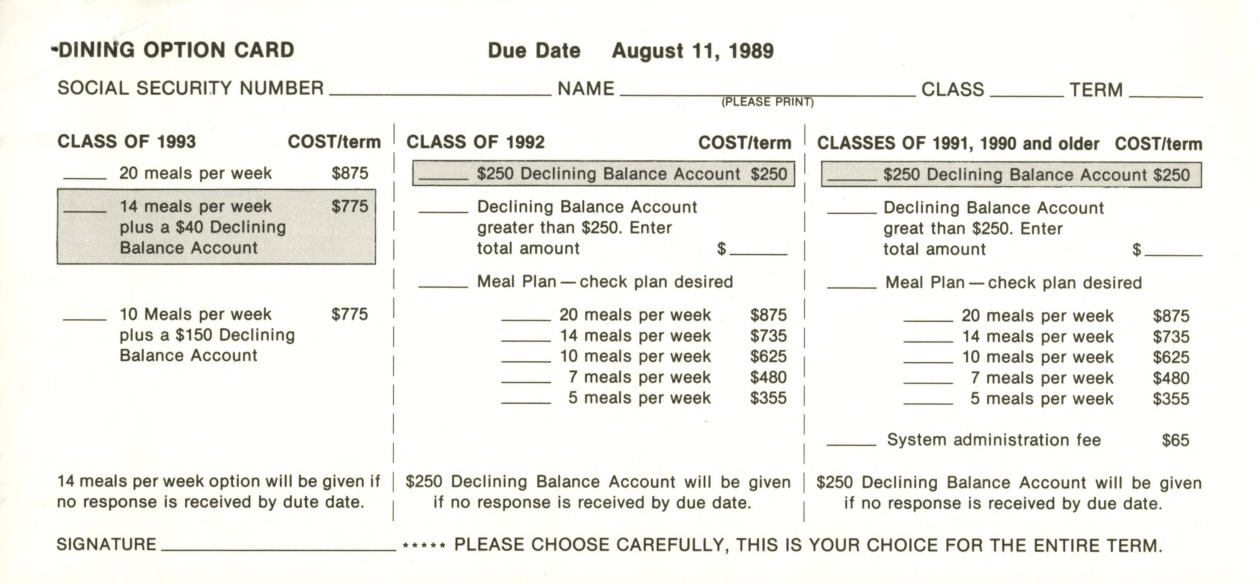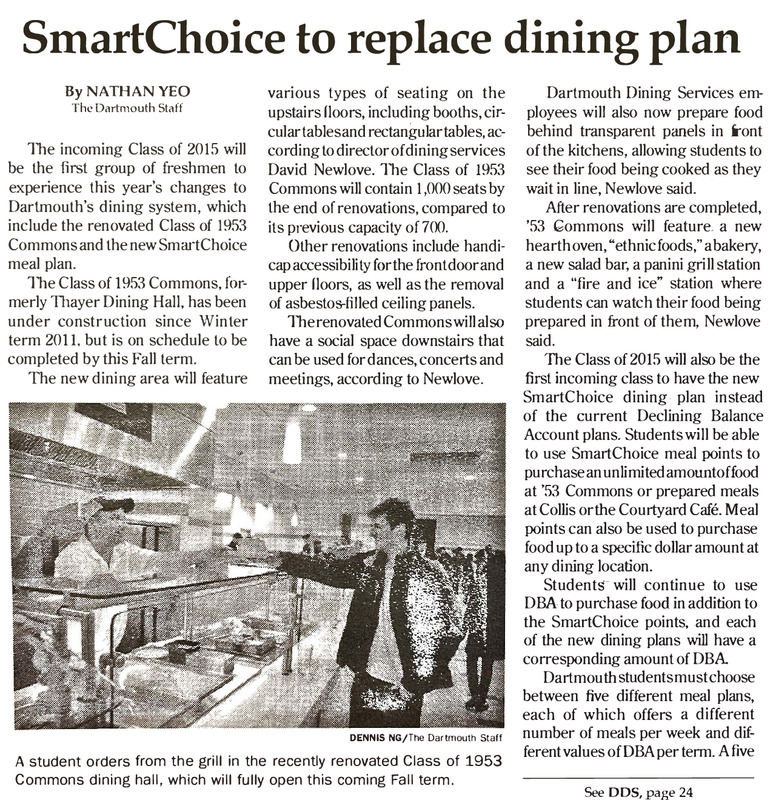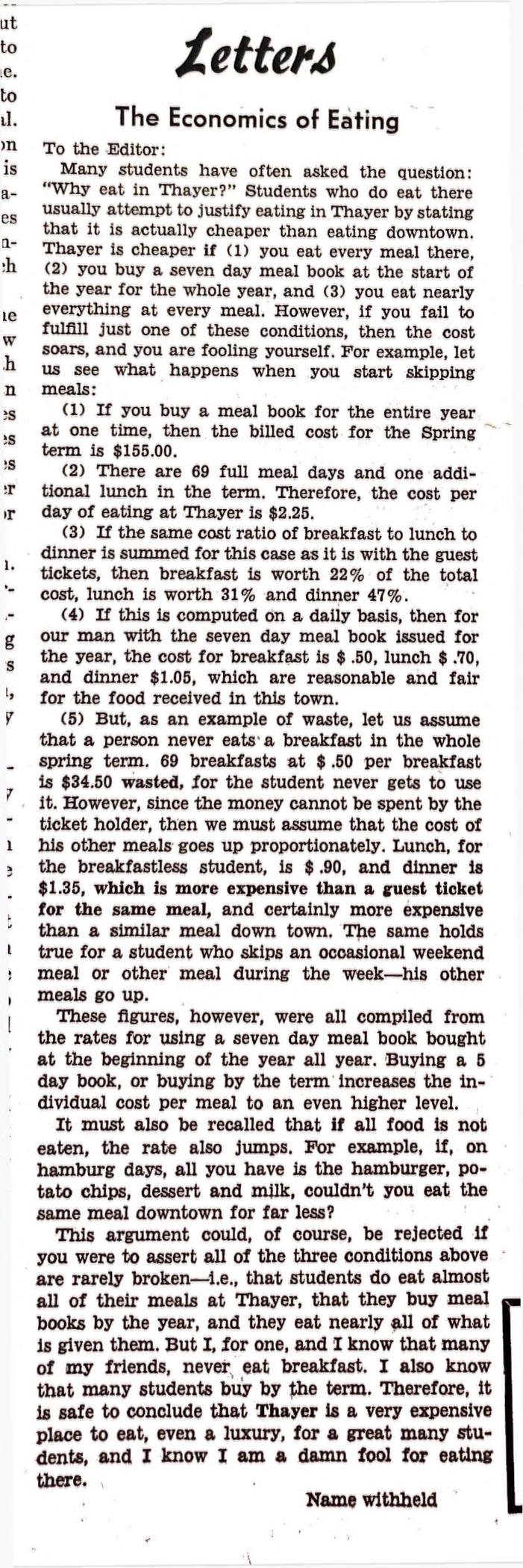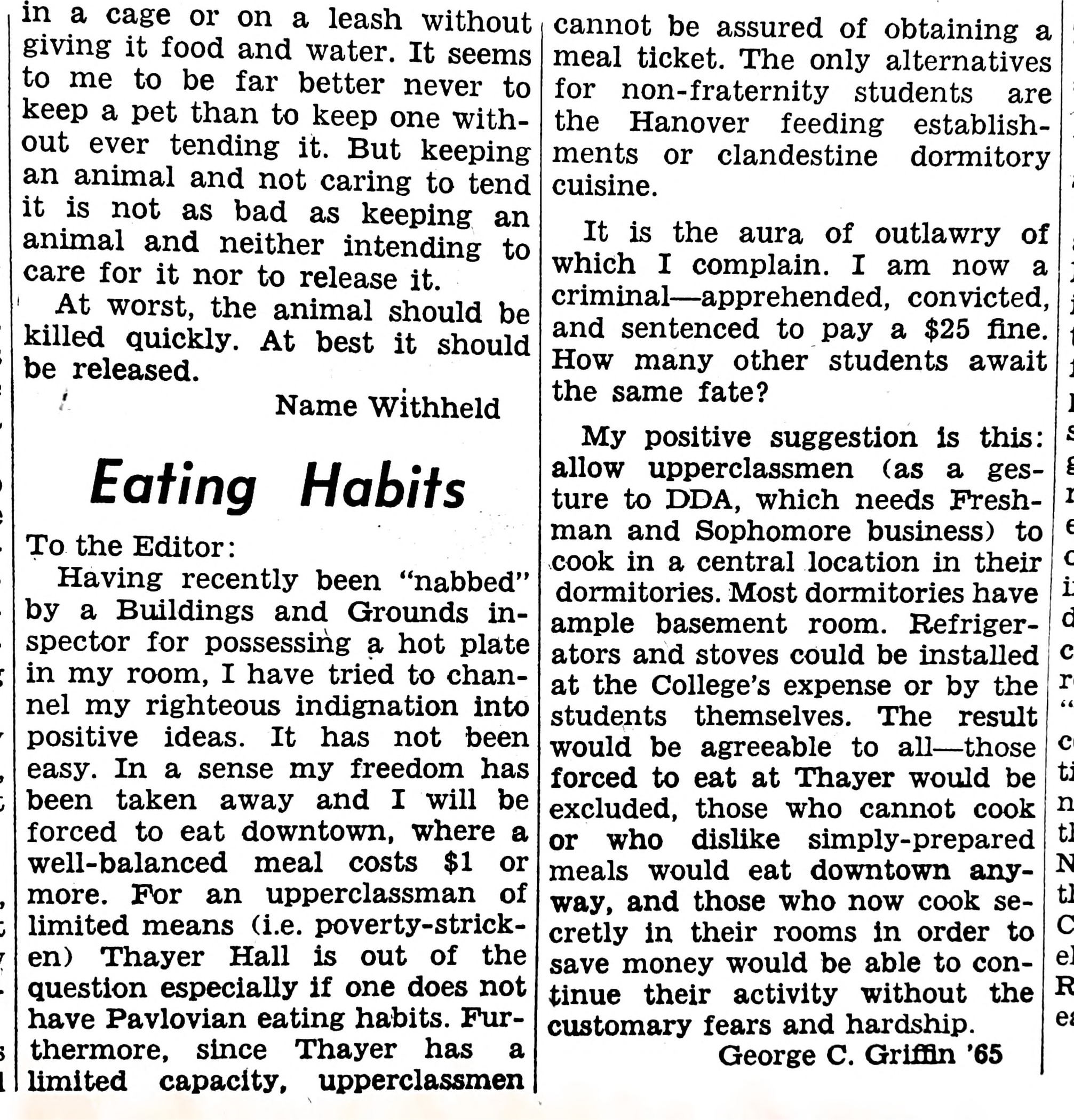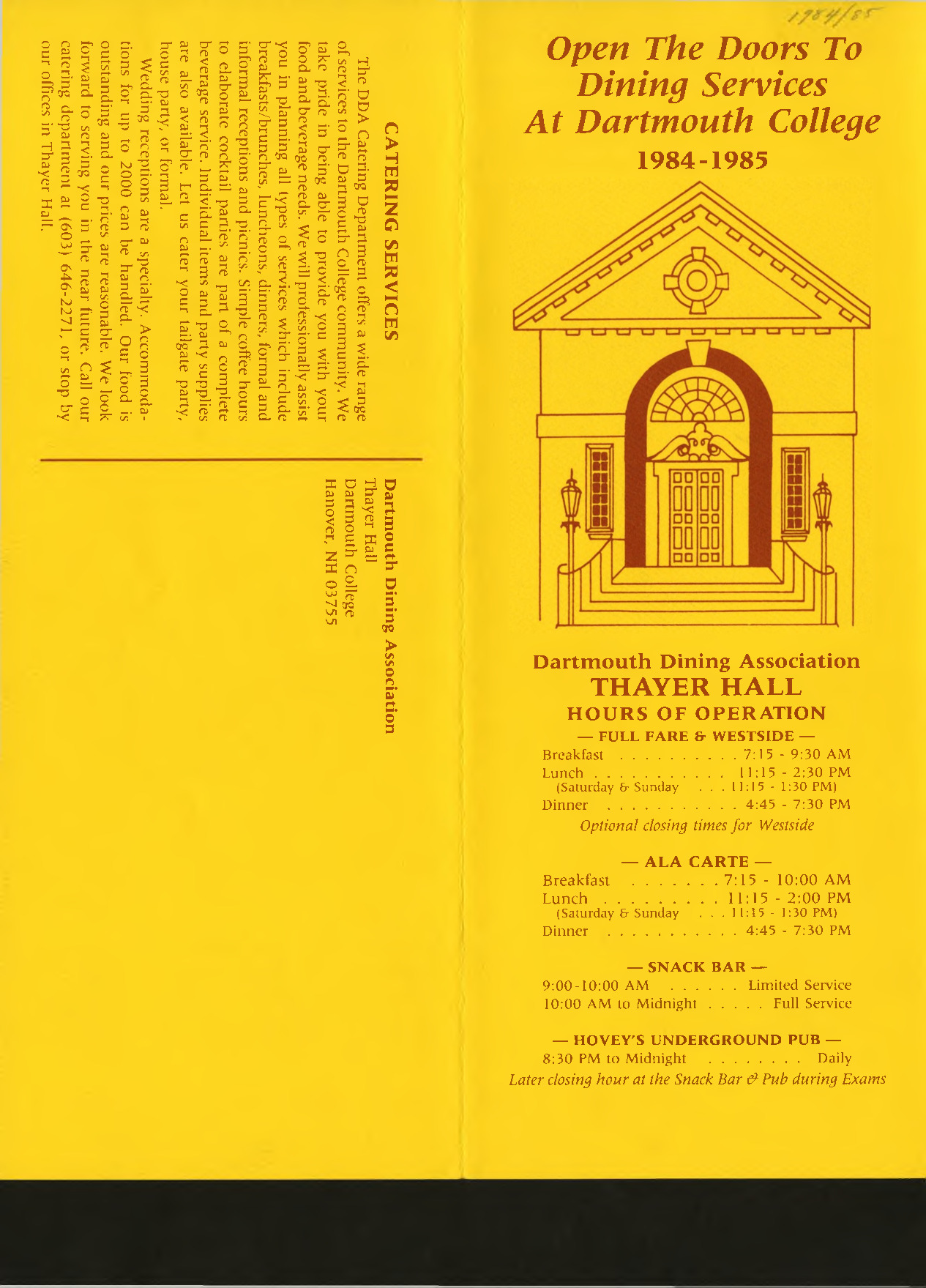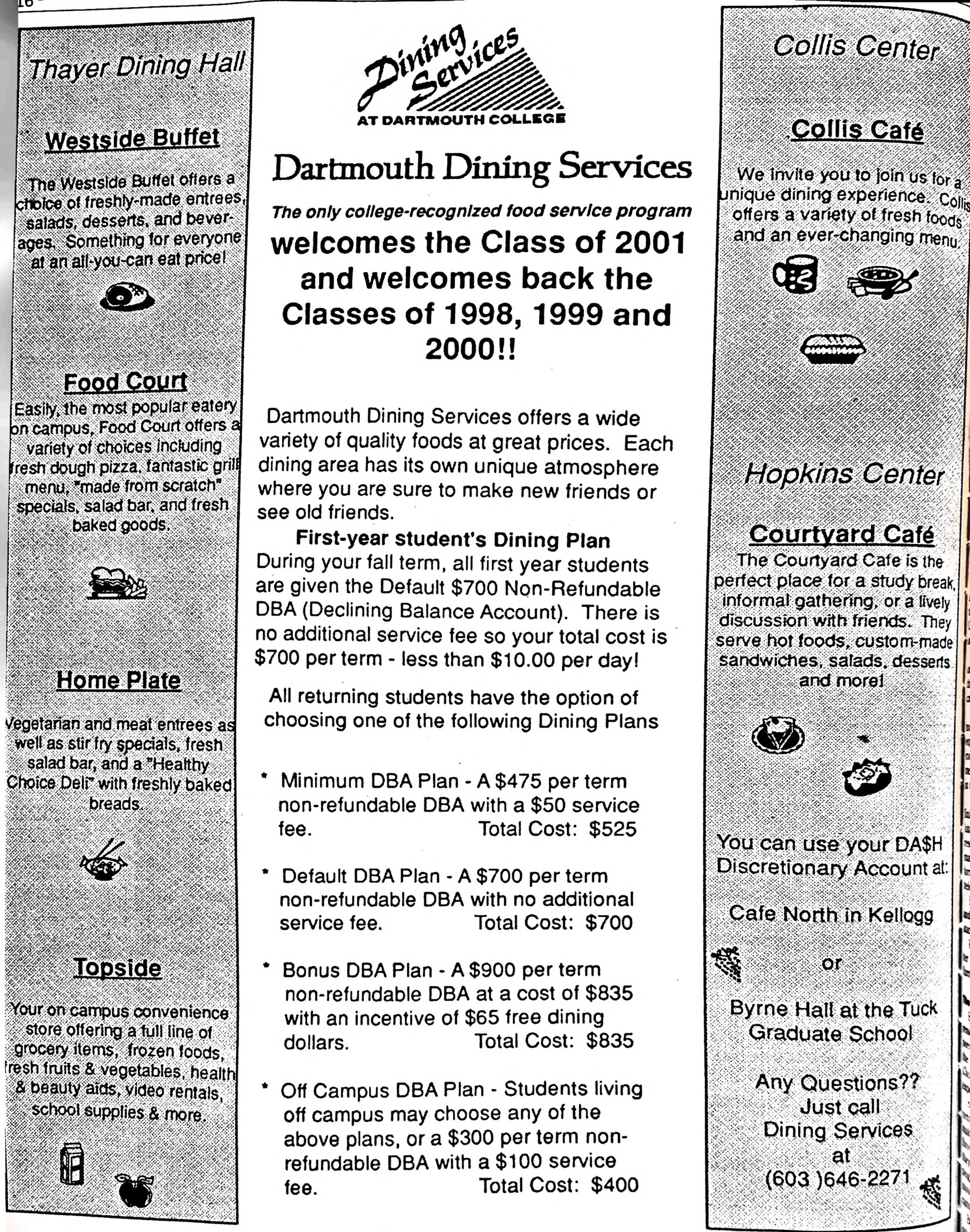Financially Inclusive Dining
While gluten and allergy-free dining has recently come to the forefront at Dartmouth, concerns regarding financial inclusivity — or rather, exclusivity — have long been a factor affecting the College’s dining landscape.
The College in 1919 announced a requirement for all freshmen in the 1919-20 school year to dine together in the Commons, which is now known as the Collis Center’s Common Ground. A broadside explained that the Trustees initiated this new measure to “insure (sic) the bringing together of all freshman on a democratic basis that [would] promote acquaintanceship and develop class solidarity; and further to provide against the increasing tendency of students to economize on food to the point of physical detriment.”33
However, despite its democratic aims, this policy failed students who could not afford these meals. Administrators explained that a “certain number of freshman of limited means” could “earn all or part of their board at Commons by waiting on table or otherwise assisting the Commmons management.”34 This “solution” to student body socioeconomic differences flies in the face of the policy’s mission to “promote acquaintanceship and develop class solidarity.” Forcing students to wait on their peers prevents them from eating with others and building relationships; it creates a visible divide between those serving and those being served, highlighting financial disparities.
First-year students are no longer required to eat together. However, vestiges of this 1919 freshman requirement still remain today. Freshmen are now required to purchase the Ivy Unlimited Meal Plan, Dartmouth’s most expensive meal plan, which while less alienating than the 1919 requirement, still puts freshmen in a more financially demanding position compared to other class years. Its “unlimited swipe” model and fewer dining dollar allocation also limit freshmen’s ability to dine at other dining facilities outside of the ‘53 Commons, which is, to some extent, isolating for first-years.
Despite these challenges, Dartmouth has generally become more inclusive of different financial backgrounds in its dining offerings since 1919.
It is unclear when Dartmouth Dining began offering various meal contracts, but a 1977 column from The Dartmouth indicates that non-freshman had the option to purchase 5, 10, 14, or 21-meal contracts.35 Students had increased flexibility to purchase a meal contract that aligned with their dietary needs and financial circumstances.
Flexibility increased following Thayer Dining Hall’s renovation in the 1983-84 academic year. Thayer’s facelift introduced a new A La Carte dining area and Topside, which was a deli and grill. Now, students could purchase food individually at A La Carte and Topside rather than paying for an all-you-can-eat option, making more financial sense for some.36
Dartmouth Dining underwent further changes in 1989 when the Dartmouth Dining Association (DDA) became Dartmouth Dining Services (DDS). DDA primarily maintained control of Thayer Dining Hall, which “had grown to include [different stations, including] Full Fare, Homeplate, A La Carte, Hovey's Underground Pub and Ma Thayer's Snack Bar.” Upon becoming DDS, “DDA assumed control of Collis Cafe, which had previously reported to the Dean of the College, and the Hopkins Center's Courtyard Snack Bar, which had previously reported to the Provost.”37 This change allowed students to use their Declining Balance Account (DBA) dollars at Thayer and non-Thayer locations, providing them more flexibility with their meal plans. For example, vegetarian students could now use their meal contract “punches” and DBA dollars at Collis, making meal plans inclusive of more dietary preferences.
There were many alterations to dining plans throughout the '90s, but the largest change since DDS’s formation in 1989 was in 2011, following Thayer Dining Hall’s renovation. Dartmouth unveiled the new SmartChoice meal plans, where students could use meal “swipes” and DBA to purchase food.38 One meal swipe corresponded to unlimited food at the ‘53 Commons; one swipe also had a specific dollar amount that could be used at any dining location. Importantly, this swipe program at the ‘53 Commons meant that students now did not have to pay more for individual kosher meals, for example.
Then Dartmouth Dining Services Director David Newlove explained that “under the previous DBA-based plan there was inequity among students based on financial status. Some students on financial aid simply chose not to spend money on College meals and ate free crackers with peanut butter.” He helped create the new dining system “to amend these inequalities” and ensure “that everyone [had] access to an appropriate amount of good food.” However, many students voiced their inability to afford the increased price of the SmartChoice meal plans.39
"Newlove said that under the previous DBA-based plan there was inequity among students based on financial status. Some students on financial aid simply chose not to spend money on College meals and ate free crackers with peanut butter, he said."
Marina Shkuratov, The Dartmouth
Dartmouth responded and increased the “[m]eal swipe values for Collis Cafe, Courtyard Cafe and Novack Cafe” in March of 2012. Additionally, they announced their fall plan to introduce an additional SmartChoice weekly meal plan that offered 10 meals per week; prior to this change, students could buy 5, 14, or 20 meals per week. That fall, students could alternatively “opt for a BlockChoice plan,” which offered “students to choose from 45, 90, 125 or 180 meals per term.” Both the SmartChoice and BlockChoice plans were similarly priced and offered DBA dollars.40
While DDS in 2024 offers fewer options compared to 2012, dining administrators have been and are still making significant efforts to create meal plans that accommodate students’ financial backgrounds, the student body’s dietary needs, and DDS’s financial demands. As of March 2024, Dartmouth offers five meal plans that have similarities to the BlockChoice Plans. These five plans are the Ivy Unlimited Plan, 115 Block Plus Plan, 80 Block Plus Plan, On-Campus Apartment Plan, and Off-Campus Plan. Students on full financial aid are provided with the Ivy Unlimited Plan — Dartmouth’s most expensive meal plan — but can choose another plan that better fits their needs. Campus individuals also have access to a nutritionist at no additional cost to help them meet their dietary needs.
However, dining-related issues continue to exist, and it is important to acknowledge them. Learn more about these challenges in the following and final page of this exhibit.
_______________________
33 Keyes, Homer Eaton. “Compulsory Commons for Freshman.” September 1919, DA-857, Vertical Files Collection, Dartmouth Dining Association I, Rauner Special Collections Library, Hanover, NH.
34 Ibid.
35 “Contracts a Hit,” The Dartmouth, March 30, 1977.
36 Dennis Sughrue, “College Revamps Dining Halls,” The Dartmouth, July 25, 1985.
37 David N. Archwamety, “Eating Clubs Preceded Today’s DDS,” The Dartmouth, October 14, 2002, https://www.thedartmouth.com/article/2002/10/eating-clubs-preceded-todays-dds.
38 Nathan Yeo, “SmartChoice to Replace Dining Plan,” The Dartmouth, August 2011.
39 Marina Shkuratov, “Newlove Responds to SmartChoice Criticism,” The Dartmouth, October 10, 2011, https://www.thedartmouth.com/article/2011/10/newlove-responds-to-smartchoice-criticism.
40 Jesse Gerson, “Daily Debriefing,” The Dartmouth, March 26, 2012, https://www.thedartmouth.com/article/2012/03/daily-debriefing-5c14227e5ffb9.
 Historical Accountability Student Research Program
Historical Accountability Student Research Program

